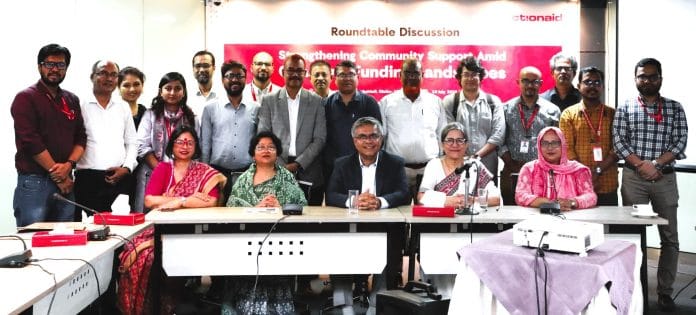Amid declining foreign aid to Bangladesh’s development sector, experts at a high-level roundtable have called for a fundamental shift toward self-reliance, domestic resource mobilisation, and inclusive, community-driven development.
The event, titled “Strengthening Community Support Amid Changing Funding Landscapes,” was organised by ActionAid Bangladesh and held at BRAC Centre Inn in Dhaka. It brought together key stakeholders from government ministries, civil society organisations (CSOs), development partners, academia, and the private sector.
Speakers warned that a steady decline in international donor support—especially in programmes targeting marginalised communities—now poses a significant threat to essential services. They stressed the need for urgent strategic reforms and locally driven solutions to ensure sustainable development.
Farah Kabir, Country Director of ActionAid Bangladesh, moderated the session and highlighted the disproportionate impact of funding cuts on vulnerable groups.
“Communities, particularly women and children, are bearing the brunt of shrinking foreign aid. From the Rohingya crisis to basic services in underserved regions, the effects are visible. We must shift from dependency to dignity—through domestic resource mobilisation, stronger CSR engagement, digital advocacy, and South-South cooperation.”
KAM Morshed, Senior Director at BRAC, called on CSOs to innovate and align their results with national priorities.
“The funding model has changed. Civil society must build internal resources, adopt emerging technologies like AI, and demonstrate impact. Legal reforms—such as tax exemptions for donations and easing of PPP restrictions—are crucial for sustaining development efforts.”
Environmental concerns were raised by S.M. Munjurul Hannan Khan, Executive Director of NACOM, who flagged serious capacity gaps in accessing global climate finance.
“Despite efforts by institutions like PKSF and IDCOL, Bangladesh Bank still lacks Green Climate Fund accreditation. The Department of Environment receives just 0.38% of the national budget. Better coordination and community representation are critical.”
Dr Khondaker Golam Moazzem, Research Director at CPD, urged CSOs to play a more active role in Bangladesh’s LDC graduation strategy.
“To stay relevant, CSOs must close tax gaps, integrate with the Economic Relations Division, and adopt technology-driven, cost-effective approaches. Duplicative projects and inefficiencies must be eliminated.”
Representing the government, Md. Aminul Islam, Senior Assistant Secretary at the Ministry of Foreign Affairs, called for updated financing models.
“The global aid landscape is changing fast. We must move beyond short-term donor cycles and develop sustainable, locally rooted business models for long-term development.”
Zakir Hossain Khan, Executive Director of Change Initiative, expressed concern over climate finance being used to replace traditional development aid without transparency.
“We must capitalise on international legal rulings like the ICJ verdict on climate justice. Carbon taxation on polluters, repackaging of resources, and local stewardship can build resilience and accountability.”
From the Department of Women Affairs, Syeda Nasrina Parvin, Assistant Director, supported stronger state–NGO collaboration but flagged corruption as a major barrier.
“NGOs need tools and access to surplus government assets, but this must be coupled with improved governance and mutual accountability.”
In his keynote, Ibrahim Khalil Al-Zayad, Chairperson of the ActionAid International Bangladesh Society, delivered a strong message on the urgency of financial independence.
“Self-reliance is not optional anymore—it is essential. We urge the government to provide tax exemptions for charitable donations, recognise diaspora contributions, and reform regulations to unlock the $7 billion in untapped Zakat funds. Blended finance, corporate partnerships, and feminist leadership are key to a resilient future.” Participants put forward several actionable strategies, including: Introducing a mandatory CSR policy or incentive framework for large corporations; Enhancing CSO capacity in governance, impact assessment, and CSR co-design; and Establishing transparent PPP frameworks in healthcare, education, and climate resilience.

